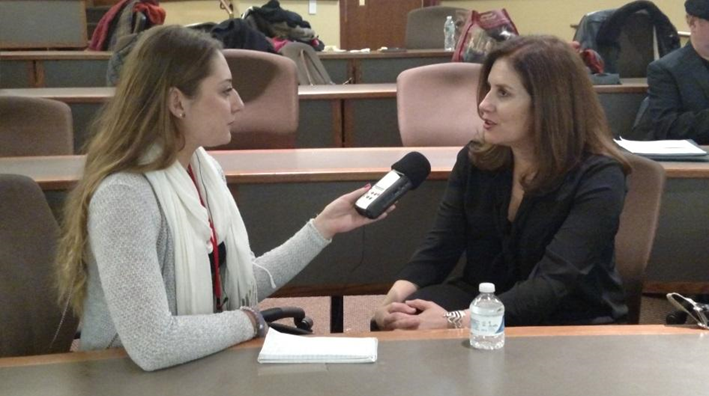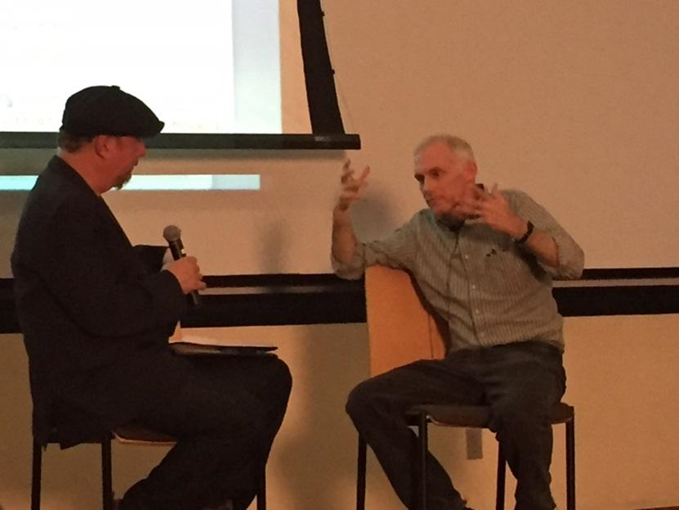
Student Samantha Williams interviewed producer Kahane Cooperman as part of Behind the Screen.
Photo courtesy of Samantha Williams
What is the best way for students to learn about the entertainment industry? Executive produce and documentarian Kahane Cooperman, one of the guests at the Montclair Film Festival’s Behind The Screen event gave her answer: “You can take classes and that’s fantastic. Nothing for me motivated me and taught me more than hearing from people who were in the world doing this.”
Cooperman went on to say that hearing lectures from leading professionals in the industry at a young age motivated her to pursue a career in the world of film. This is exactly the point that the Montclair Film Festival (MFF) was hoping to get across at Behind the Screen on Sunday, Dec. 6.
MFF brought multiple professionals from the film and television industries to Montclair State University to discuss various aspects of the entertainment field for its annual educational program. The panels were held throughout the day and were open to students and the community.
Cooperman and Academy Award-nominated film editor Tim Squyres held two panels which gave an inside look into the industry. Cooperman’s panel discussed what it means to be a producer and her upcoming Amazon show, The New Yorker Presents. Cooperman was the executive producer for The Daily Show with Jon Stewart for 18 years, has produced and made several documentaries and is now the executive producer for Amazon’s first documentary style series.
She said that the title of producer does not have one definition. Instead, it is an “incredibly creative” and collaborative position. She described the role of producer as “the glue” of the show who is responsible for “[taking] all the millions of parts” and making them fit together.
Cooperman has worked on cable and streaming platforms and shared the difference between the two: “The Daily Show was a daily deadline. Four nights a week, we were putting out about 22 minutes of content that had to be turned around really, really quickly the day of,” Cooperman explained.
With The New Yorker Presents, which is currently still in production, it takes a lot longer to film each short film, which are based on articles from The New Yorker magazine. Cooperman explained that the show is being filmed on a television production schedule, even though it will only be streamable. She said that it is “a very, very different approach.” Amazon also allows for riskier content and constantly pushes the boundaries by giving its showrunners “more freedom,” according to Cooperman.
Cooperman also sees a bright future for multi-platform services. She said that anyone starting out in the business today should be “very excited because I think what digital has done is just totally [broadening] the horizon for opportunity for people and for content.” Today, the traditional options of film and television are joined by endless forms of digital content websites and streaming services.
When asked about the importance of networking in the industry, Cooperman responded, “Oh my gosh! It is so important, it’s ridiculous. There are very few jobs that ever actually get advertised.”
Squyres feels the same way. “Networking is the most important thing. It’s all about who you know and how much you impress them,” he said.
During his panel, Squyres discussed the tedious process of film editing and his experiences with working with director Ang Lee. Squyres has edited all but one of Lee’s films and was nominated for two Academy Awards for his work on Life of Pi and Crouching Tiger, Hidden Dragon. He used numerous clips from the films he has edited to explain how editing is done.
His personal style is to start editing scenes right away to make life easier. If filming starts on a Monday, he gets the footage on Tuesday and gets to work. Squyres said that he may have one or two hours of footage that need to be cut into a one-minute scene. To do this, he cuts the scene three times using multiple shots from different perspectives. He then sends the different cuts to the director to see whether all the necessary shots were filmed.
Squyres said that it is very important to cut as you shoot to make sure each scene has the proper footage.
That first step is also Squyres’ favorite part of the job. “I really enjoy the assembly phase, taking a couple hours of dailies and trying to make it into a scene,” he said. He also really enjoys sound mixing.
As for the worst part of the job, “with big movies, with big budgets, there’s a lot of studio involvement and sometimes that’s great. There’s a whole process that you have to go through with testing and sometimes that can get tiresome.”
Squyres gave some good advice for aspiring film directors and editors: “It’s important to remember that film is a collaborative art form. Movies are just too expensive. Nobody can be in charge. Even the director has to be a good collaborator,” Squyres said. He went on to say that it is “crucial” to be a good collaborator and have good people skills. For anyone that is not sure of what aspect of film they want to pursue, Squyres recommended trying a bit of everything. “Try editing. Try camera. Try sound. Try all those jobs and see what feels right,” he said.
The Behind the Screen event was truly successful, as students were able to learn more about the entertainment industry from some of top professionals in the field.



